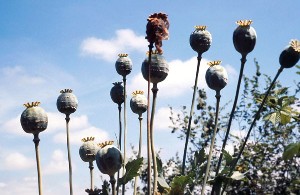Commentary:
Direct
from
Kabul
--
DRCNet
on
the
Scene
in
Afghanistan
This
Week
and
Next
9/30/05
David Borden, Executive Director, [email protected]
DRCNet condemned the Taliban in this newsletter in 1997, as US and UN officials moved to try to fund the rights-abusing pseudo-government to do opium eradication. We are proud to have been ahead of the curve, but also sad -- sad that our government was willing to sacrifice principles and risk hardening the grip on power of that oppressive, extremist regime for the sake of waging an ineffective drug war. Opium is the mainstay of the Afghan economy, the provider of financial sustenance to a people who have little in the way of alternatives, and that alone makes the official position of eradicating the crop untenable. So it was foolish, if not outright irresponsible, for Afghan and UN officials to so quickly dismiss the proposal unveiled at this week's Kabul drug policy conference of licensing the opium crop instead of prohibiting it and buying it up for use in the licit medical market. What right do they have to deny struggling Afghans the chance to earn a simple living without the fear of government helicopters swooping down and poisoning their land and crops and perhaps their selves? (They haven't actually started using the helicopters yet. But they will, and they are eradicating.) Why shouldn't Afghan farmers be allowed to offer the fruits of their agriculture for the legal market in anesthesia and pain meds? Other countries' farmers are allowed to do so. The statements were also irresponsible with respect to the needs of pain patients. A UN Office on Drugs and Crime official said that it was impossible because there was already enough legal opium being grown to meet the needs of medicine. That is as bad as what the DEA is doing to pain patients here in the United States, where physician prosecutions, even if small in number, have a chilling effect on the willingness of doctors to write opiate prescriptions to pain patients or to write them in the appropriate dosages. That needs to change -- denial of pain treatment is tantamount to torture -- and when it does change we will need more opium to be grown to make more of the medicines. But it's not just about us nor even primarily so. According to the 700-page report prepared by the organization sponsoring the conference, pain medicine is not available in sufficient quantities to serve the medical needs of Afghanistan and other developing countries. That is important, and for the most basic of humanitarian reasons, the right to not be tortured by denial of pain medicine. But while talking about the medical market and the Council's clever proposal to help Afghanistan, it is equally important to bear in mind that drugs are not sold illegally simply because the people doing so lack other alternatives. Drugs are grown and sold because there are people who like or at least choose to use them -- and as long as people choose to use drugs and are willing to pay for them, someone will choose and find a way to provide them -- and there will always be people who choose to use drugs. Any give opium farmer might be willing to find a new crop or job if a decent one is offered. But someone else will take up the slack, if not in Afghanistan than elsewhere. Supply fills demand, certainly for a product as lucrative as drugs are. So while buying Afghanistan's opium crop for medical uses may well help that country -- maybe a lot -- in the long term it won't reduce the global supply of opium for non-medical uses. Not because there's anything wrong with the proposal, but because in the long-term that is something that cannot be done -- supply fills demand. Which brings us back to the core, the underlying problem hurting everything that if changed can help everything -- prohibition, and the need for some form of legalization to replace it and bring drugs within the control of law. If, as some policymakers claim, the opium trade is helping to fund terrorism, why haven't we legalized the trade to divert that money flow away from the criminal underground?
Those of you who have met Drug War Chronicle editor Phil Smith know that he is adventurous. So, it was no surprise that, on hearing about the Kabul conference, he pitched the idea of attending it and spending a week or two doing investigative reporting in the area. Thanks to generous support from the company Dr. Bronner's Magic Soaps, Phil is there now. This week's issue of Drug War Chronicle features three special reports from Kabul and the conference -- an initial report on the conference (a much longer one will run in the Chronicle next week); a discussion of Iranian and Russian reactions to the Senlis proposal (they are intrigued); and a look at the Nejat Center, a harm reduction organization running out of a dusty side street working hard with little funding to stem the spread of HIV in Afghanistan, and some of its former clients turned volunteers. The threads of prohibition link the streets of Kabul and the countryside of Afghanistan and its people to the marginalized, poor and imprisoned of the United States. In this special series -- and in Phil's daily web log written on the scene -- we attempt to shed light, not only on Afghanistan and its struggles, but on the ideas and ideologies at work in US and global drug policy and the impact they are having on people's lives. For all the importance we placed on Afghanistan four years ago after terror struck, we don't really think about it that much, and we don't really understand it. But a little understanding can go a long way. Minds met in Kabul this week, and Phil's Afghan adventure for DRCNet continues awhile longer. Stay tuned -- and read on.
|


